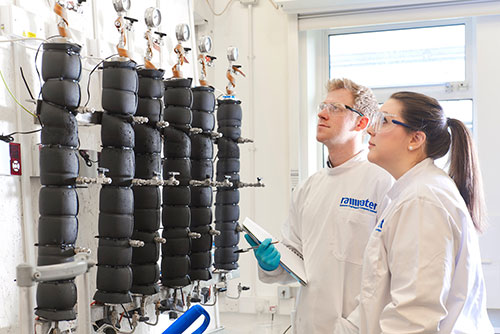Rawwater, the leading specialist in oilfield reservoir souring forecasting, simulation and control, is establishing a flagship Carbon Capture Storage (CCS) R&D Hub at its Warrington-based HQ. Knowledge derived from the Hub’s activities will assist the UK in becoming a global leader in understanding the microbiology of carbon capture storage environments and help expedite the Government’s Net Zero 2050 target.
Working in collaboration with the Manchester Institute of Biotechnology at The University of Manchester, Rawwater will simulate underground carbon capture storage environments, study the effects of subsurface microbiological activity on CO2 storage, and develop essential mitigation tools and strategies.
This ambitious project will benefit from Rawwater’s extensive oilfield souring dataset gained over 30 years of conducting souring studies and will involve the use of a specially-developed suite of pressurised bioreactors that will be used to model CO2 injection and storage into depleted oil & gas reservoirs and saline aquifers.
Although various field trials conducted to date have demonstrated the successful injection of CO2 into target formations, the impact of microbiology on long-term storage is largely unknown. It is for that reason Rawwater believes that laboratory-based simulations are necessary to imitate real-world CO2 storage facilities, particularly as it is unrealistic to conduct such studies in-situ.
“For the worst-case effects of climate change to be avoided, it is widely accepted that industrial CO2 emissions must be captured from the atmosphere and permanently stored below ground via Carbon Capture Storage (CCS) solutions,” comments Rawwater’s Senior Research Scientist, Leanne Walker. “There is, however, an unknown, potentially significant problem that could impact the success of the CCS strategy – namely, the subsurface microbial life which exists in areas selected for CCS, and the effect such life could have on the injection and storage of CO2.
“Downhole microbial activity in oilfield reservoirs costs the global energy sector hundreds of millions of pounds annually through the creation of polluting and corrosive hydrogen sulfide (H2S) gas,” says Leanne Walker. “If problematic microorganisms are found to thrive in CCS environments, they could negatively influence the long-term success of CCS decarbonisation strategies, with the potential for CO2 leakage, environmental damage and costly storage facility repairs. Our research, in association with the Manchester Institute of Biotechnology, will provide a vital understanding of how downhole microbial life responds to the input of CO2. It will also enable organisations involved in CCS to better understand the potential scale of microbial problems and put robust monitoring and maintenance regimens in place.”
Dr Sophie Nixon, the University of Manchester lead investigator on this research, adds: “The subsurface hosts the unseen majority of microbial life on Earth, spanning a remarkable diversity of life that we still have relatively little understanding about. As we look to the subsurface to store captured CO2 in an attempt to decarbonise our future, it is critical to better understand the role subsurface microbiology plays in these major engineering interventions.” Dr Nixon recently won a major research fellowship from the Biotechnology and Biological Sciences Research Council (BBSRC) to investigate these issues in partnership with Rawwater. “The ability to recreate the subsurface in the laboratory is essential to gain fundamental understanding of how subsurface life adapts and impacts on CO2 storage,” concludes Dr Nixon, who is establishing a dedicated research group to investigate the microbiology of the engineered subsurface at the Manchester Institute of Biotechnology.
Findings from collaborative research using Rawwater’s Carbon Capture Storage (CCS) R&D Hub will be translated into fundamental insights for the creation of maintenance and monitoring biotools for field deployment. As the conditions within each CCS subsurface environment selected for CO2 storage are likely to be unique, long-term use of the Hub will provide the energy sector with highly valuable, tailored microbial forecasting and profiling of potential target formations prior to commencement of new CCS operations. Rawwater’s partnership with the Manchester Institute of Biotechnology will ensure the use of cutting-edge scientific approaches to set a global benchmark for microbial forecasting. The project will utilise Rawwater’s existing world-leading expertise in subsurface microbial forecasting and the Institute’s cutting-edge microbial genomics expertise and facilities.


